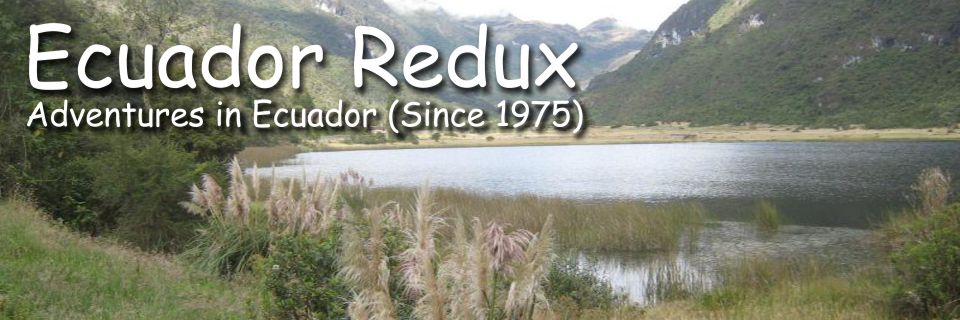Retiring to Ecuador Can Be Stressful? Part 1
Retiring to Ecuador Can be Stressful? Part 1
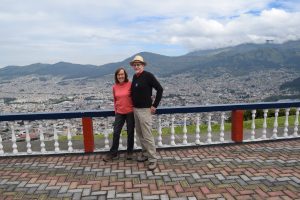
John & Cheryl’s First Day in Ecuador: at an Overlook in Quito
We moved to Ecuador June 3 of 2016, and love it here, but retirement to a foreign country is not all smooth sailing.
Having never retired or moved to a foreign country before, I didn’t expect a hard landing with choppy waters! Given my years in Ecuador in the 1970s and 80s, I figured retirement would mostly be a cake walk. Hey, I speak intelligible Spanish and presume to know the culture. Sure, there will be setbacks and unexpected delays, but patience will suffice. Tranquillo.
Having just read “You’re Retiring to Ecuador? Are You Loco?” by Wayne Robert Hanson, a Chicago expat in Ecuador, I understand that humor and a sense of adventure help. Thankfully, we have both. Hanson and his wife were Ecuador expat pioneers and sailed rougher seas than we did….. so far. We haven’t received our household goods from Chicago or moved into our house yet (as of May 30 when this post was written).
I have been avoiding talking about the setbacks in our bumpy Ecuador landing but it’s time to share.
A Professional Theft in Quito — First Day in Ecuador
As John and I stepped away from the mini-van at the Lookout in south Quito, I remember it in slow motion. The parking lot was completely deserted except for one man walking away from us, our 8 large suitcases and my purse were in the van, and I watched the driver slowly close the sliding doors on each side of the van. Only when both doors were closed did I walk on to the Lookout, with my new Nikon D3300. We had made it! We were in Ecuador and on our way to Cuenca. I could relax and enjoy the view of urban sprawl in the valley south of Quito. The driver took our picture and we returned to the van. Driving through Machachi, the driver stopped to pick up his wife and talked to his son, before heading off to Cuenca. When we stopped at a gas station minutes later, I instinctively looked for my purse to take with me to the bathroom. NO PURSE! PANIC!
The last place I’d remembered my purse was at the Lookout I told the driver. Did he not lock the car doors when we were at the Lookout? Why not? The driver shrugged. The driver returned us to the Lookout and we spent the rest of the day, with him and his wife and the local police and, later, the downtown police filling out a “Denuncia” (Police Report). UGH!
Our time with the local police was combination Keystone Cops and Casablanca. The police were inept and had us ride in their car , up, down, and around tiny hillside roads as they chased “the usual suspects.” Later, they rounded up local drunks to ask if we had seen any of them. No. They didn’t question our driver! They didn’t seem at all prepared for what appeared to be either an inside job — coordinated with the driver — or a professional gang. Further, the computers at the barren and run down police station where barely functional. Clear lack of resources. But by 4 pm we had a Denuncia — necessary to prove our Passports were stolen and get new ones — and the driver dropped us off at the Hotel Savoy, where we were taken in without ANY identification.
Normally we travel with important documents in security pouches underneath clothes, but on this trip, I did not. I felt a purse would be safe in airports and hoped to travel all the way to Cuenca on airplanes. However, Tame, the national airline, had other ideas. They cancelled our flight from Quito to Cuenca, originally to arrive Friday night, about a month prior to our trip. I had tried to get this resolved, with Expedia, before our flight but had no luck. I had tried to get reservations with Tame for the next day well ahead of time, but no luck. Once in Quito, I asked the hotel desk for help getting a reservation the next morning – Saturday morning. No luck. After multiple calls, I did reach one agent at Tame and we talked. She said she would call back but didn’t.
We arrived in Quito from Chicago around 6 pm and it was now around 9 pm in the Quito Wyndham Hotel, an ultra-modern hotel next to the airport. I had not had more than an hour of sleep in the last 48 hours. My brain was struggling to function and my body was resisting the urge to lie down until all was squared away. I was handling all arrangements due to my Spanish. In the last 3 days, I had sold a house; sold a car; cleaned and cleared out the house with the emergency help of John’s son and daughter-in-law; hurried around getting friends to take care of John’s personal belongings which remained in the garage; finished packing 10 pieces of luggage; and called for a taxi van for early Friday morning, June 3, to O’Hare Airport.
On the second leg of our Copa flights, from Panama City to Quito, John struck up a conversation with an Ecuadorian man seated next to him, who was vision-impaired and carried a cane. I was leery of him and keep to myself — all I could think about was getting to Cuenca with all our possessions intact. I could not relax until then. No sleeping on the plane for me. John kept chatting with the Ecuadorian, who offered to send a relative with a van to take us to Cuenca the next morning.
I was surprised to get a call from this man in our hotel room, giving me his relative’s name. I let the name and number sit for a while, being unsure it was a good idea. I wanted a plane flight to Cuenca, not a 9 hour ride. As it was approaching 10 pm, I asked John if he thought I should call the number. John often has good instinct and I was running out of options. John said “yes.” (The hotel didn’t mention the van companies at their doorstep that could have taken us to Cuenca.) So I made the fateful call and have felt stupid about it ever since!
The night before I had organized all very important documents and put all in my purse. I assumed a private van to be safe. Ha! My purse contained John’s Note 4 phone, our passports, my Illinois drivers license, bank check books, luggage keys, storage room key, credit cards, and $300+ to cover cost of the trip. Thank goodness I kept most of our money in one of the suitcases along with a new unlocked Samsung phone.
I know what it feels like to have no country of residence, no ID, and no phone. In that situation, you can’t even activate a new phone because you have no ID! When asked where you live and what your phone number is, what do you say?
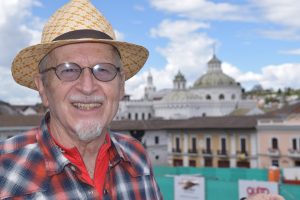
John in Colonial Quito: Plaza de San Francisco
We made the best of our unexpected weekend at the Hotel Savoy in Quito. Sunday was spent visiting the Colonial part of Quito — which I never tire of — and checking out a local food court. The Hotel management let us use their Magic Jack phone to call the US — bank and credit card company. Quite a relief!
We managed to get new passports at the US Embassy — where no one speaks English at entrance — after lots of work, Saturday and Monday. The hardest part was jumping through hoops to be allowed inside the Embassy — on the outskirts of town behind concrete block walls. For example, I had to phone the Embassy to get permission and instructions for how to be allowed in! I had no phone, so I had to find a pay phone. So to get inside the embassy one had to successfully use an Ecuadorian phone, successfully reach the right person by phone and then fill out a bunch of forms with photos at a private business located nearby! Cash was essential. Once inside the Embassy, everyone spoke English and the process was efficient. We got the process started just before the noon break and picked up our passports around 4 pm the same day. I honestly don’t know what people do that can’t speak Spanish in this situation!
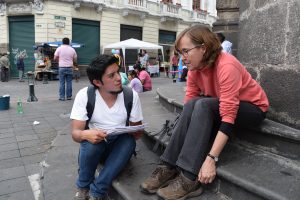
Cheryl in Colonial Quito: Answering Questions for a Student Survey of Tourists
Family Emergency
Family emergencies can happen anytime. In our case my family emergency began a month before our June 3 move to Ecuador. Near the end of our visit with my elderly Dad, he slipped and fell INTO the bathtub during a nighttime trip to the toilet but didn’t cry out — short term memory probably failed him, forgetting he had visitors. By late morning, I went into his room to check and discovered the accident. John called 911 and we all went to the hospital. Extending our stay, we were able to get him back home with round the clock home care and get him signed up for assisted living care in the near future.
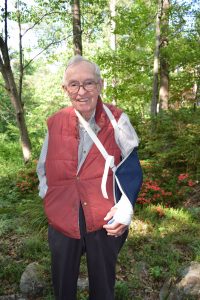
Dad: Happy to be Home from Hospital
I will ALWAYS be grateful we were there! It probably saved his life. He was not wearing his alarm bracelet and he had refused home care up until then. Six months previous, I had gotten Dad signed up with a privately-run elder care program — Athens Council on Aging — which was extremely helpful. I could not have managed without their help!
With Dad scheduled to stay at an assisted living facility (which my brother handled), I realized that he’d need help selling his home, as my brother works full time. So I booked a trip for July from Ecuador to Georgia, hoping the month of June would provide sufficient time in Ecuador to handle the resident visa process. As it turned out, it did disrupt the process but not fatally. It also turned out that I needed to return for Dad NOT to prepare his house for sale BUT to get him out of the highly-rated assisted living facility which he hated. Sad commentary on elder care industry!
I will always cherish the 3 1/2 week visit with Dad. It was a chance to talk with him every day and to help him find a better living situation. With help of Athens Council on Aging, I set up home care — 2 visits a day — to ensure someone could check on him in case he fell again, but also to check on pill-taking, and general cleaning. We got all legal health info and instructions ready and located on refrigerator door, in case of medical emergency. I weeded his large overgrown front yard in the July heat of Georgia. I ordered a new refrigerator — replacing the 40 year old energy hog. I discovered a few weeks into the stay that his 3-unit rental property, which he told us was “fine,” had not been rented for nearly a whole year! I jumped on that immediately, talked to the rental management company who said it was not in good condition and would need work; then to several real estate agents. A good agent had it sold within a month at a good price. I was lucky in that my brother was, by now, handling all Dad’s finances.
But what ultimately happened? My Dad fell again at the house, 10 days after I left. The afternoon home care person discovered him, in pain, with a fractured hip, and got him to the hospital again. He stayed in a rehab facility for about a month, finally realized he was not returning home, and suggested he move to a place near my brother in North Carolina. My brother was able, on weekends, to handle the 2nd fall and the move to North Carolina — and my Dad did not reject the superior assisted living care place in North Carolina. His comment about the new place: “the food is OK.” My brother and I had worked our asses off, so we were happy Dad approved. It meant he would stay.
Getting Our Residency Visa — Seven Months of Frustration
What should have taken less than a month took seven. What should have taken less than $1000/person took three times that.
What I learned:
- Don’t get a 6 month visa ahead of time through the Ecuadorian Consulate in Chicago thinking you are being smart!! The staff will not talk to you until AFTER to fill out all the visa application forms online– which are not clear. And when you ask for a 180 day visa they will change it to 90 days because they think they are being helpful. They are unaware that the tourist visa I selected is not transferable to any other visa, and therefore, a bad choice for someone wanting to transfer to a resident visa. Forget the Consulate– the staffer I spent hours with was well-meaning but not knowledgeable!! Just go to the airport with your passport and when you arrive in Guayaquil or Quito let the customs agent give you a 90 day, T-3, tourist visa.
- Expect the unexpected. No two people will have the same experience because the policies and people enforcing them can be extremely fickle. To avoid risk, contact an Ecuadorian lawyer and have them advise you about which documents you will need to bring to Ecuador. I thought about doing this but balked at the $800/person fee. In hindsight it would have saved me LOTS of time and money.
- Don’t have your FBI background check done very far in advance of your move to Ecuador. I had read otherwise and started too soon. The background check is only good for 6 months. The entire process must be started again after 6 months are up. Use an FBI channeling agency and expect it to take about 6 weeks — or even less if you expedite everything.
- Be sure to get a criminal background check from your state too. Plan a month ahead for that.
- If you have to initiate an FBI background check from Ecuador, don’t use USPS $24 “Priority International Mail.” See previous post. Instead spend $75 for 2 day express from FedEx.
- If you have a choice between using the Azogues and the Quito office to obtain your resident visa, choose Quito. The staff in Quito are seasoned professionals. The Azogues office is new. Its staff can be fickle and ridiculously picky.
There are new Resident Visa rules in Ecuador that are requiring immigrants to apply for a temporary resident visa good for 2 years before applying for the permanent 10 year visas two years later. We finalized our Resident Visa a few days before the new rules became law here. We can be thankful for that.
With our permanent Resident Visas, we applied for and received our national ID cards — cedulas. With a cedula, one has most of the rights of a citizen. We will be eligible to vote in Ecuador’s elections in 3 years.
The blow-by-blow description of our resident visa process (not required reading):
- Years before our move, I read expat blogs and visited Ecuador government website for details about types of resident visas and documents needed. Less than a year before our move, the rules for Professional Resident Visa appeared to change. Lots of folks were reporting that this Visa was ideal for anyone with a 4 year college degree. It didn’t require one to have a job in Ecuador and there were NO financial requirements. The Pensioners Visa would also have worked for us but it stipulates that one not be gainfully employed. We didn’t like that restriction — ever optimistic that Ecuador, or someone, would want our expertise. So far, this decision has not been a problem.
- Six months before our planned June move to Ecuador, I contacted the Chicago Consulate, with hopes of getting a 6 month Tourist Visa, in case of delays in the visa process in Ecuador. This was a great idea in theory but ended up being a real killer.
- When we arrived in Cuenca in June, it was obvious that I was no longer going to be able to handle the process of getting our resident visas myself, as originally planned. We had just had our passports stolen, I knew I would be returning to the USA in less than a month to visit with my Dad, and the FBI background checks expired the end of June. This required experienced, local legal help — fast. We used the services of Lawyers Idrovo and Velastegui, and were glad we did! Nelson Idrovo quickly discovered, at the Azogues office, that the Tourist Visa we had was non-transferrable AND that I had to provide a copy of my PhD dissertation to authorities and a letter from the University of Illinois confirming that I had indeed sat in class for my PhD back in 1970s & 80s! (Concern about online PhD mills, apparently.) When Nelson asked, in Azogues, how old the latter two requirements were, he was told “2 weeks.” Upon returning to the Azogues office with all the requisite documents, including the dissertation and letter sent by FedEx to Ecuador, Nelson hoped there would be a work-around. But Azogues staff balked, saying we had to wait out the 90 day visa before getting the resident visa — no exceptions. This meant the FBI background check would expire. Ugghh!
- When I returned from Athens, Georgia in late July, the official at the Quito airport changed my Visa to a T-3, which would seem great. However, it was an error. He should have written in the 12-10 that the Chicago Embassy gave us. This was discovered in Cuenca and required multiple trips to correct and much discussion about how to deal with this at the Peruvian border. In the end, the mistake was not fixable returning to Ecuador from Peru, despite much discussion with border staff. These errors were; however, corrected at the Migration Office in Cuenca, as the border staff had predicted, giving me 89 days extension on my visa, while John had 90 days.
- While in Athens, Ga I had brought copies of our fingerprints to begin the FBI background check process again. The process took a few days longer than my stay in the US, so I had my daughter receive the final apostilled documents and send them on to me in Cuenca. Because we had over 2 months to spare, I advised my daughter to use the USPS’s $24 Priority International, which used a tracking code and estimated 6 to 12 days ETA. After 2 months of waiting for this package, one of the ladies at the Cuenca Post Office said something was wrong; that it should have arrived. A quick call to my very capable daughter revealed that this was NOT a reliable way to send international mail — despite what we read online at USPS — and that it was likely hung up in Ecuador’s customs. I considered a trip to customs in Quito, but after discussion with locals, decided it was hopeless.
- As our time was running out on our 89 and 90 days extensions, I began the process of getting FBI background checks for the THIRD time. The fingerprinting expert at the PJ (Policia Judicial) near the airport knew us. We were the smart alecs who said “Pachamama” was our religion on the form. He had like that. For the second time now, we were visiting him to get fingerprints — 2 copies each. While we were waiting, we watched an Ecuadorian man in the process of getting a firearms permit for his gun. He lived in the countryside and need to shoot it off into the air occasionally to ward off thieves. He had a military person accompanying him at all times and was taken into a sound-proof booth so his voice and face could be recorded on tape!! (Wish the US did this.)
- About 14 days before our visas were to expire, we received our third FBI background checks from the US. Nelson sat us down in his office and he reviewed every piece of paper that we had to present to the authorities. He found one document (from the state of Illinois) that had a tear on the corner. He said the folks in Azogues might not accept the document because of that. Did we want to sent the documents to Quito instead? There was the possibility that we might have to appear in Quito, he mentioned, but he was confident that our documents would be accepted. We said “yes, send them to Quito.”
- Within a few days we were told that our photos on our original Tourist Visa were not find-able in the electronic system. We had to have new photos taken and it had to be in the Quito office. We got round trip tickets to Quito and flew out ASAP. A few days later, our Resident Visas arrived in Cuenca (via airmail). SUCCESS!!!
Re-reading this now, in late September, I wish I had posted this on March 30….. and kept up with the blog….. but I’m back. We’ve now moved into our beautiful house, unpacked most of our boxes, entertained family from the US, had friends over for meals, and are slowly furnishing the house. It’s time to start blogging again.
The other topics I had planned under this topic will wait til mañana.
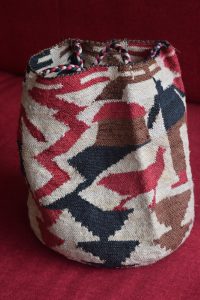
Authentic Shigra from 2016, pueblo Papaurcu near Salcedo
Category: Cuenca Move 2016, Expat Life in Cuenca, Prepping to Move into New House, Uncategorized, Visa/Residency
